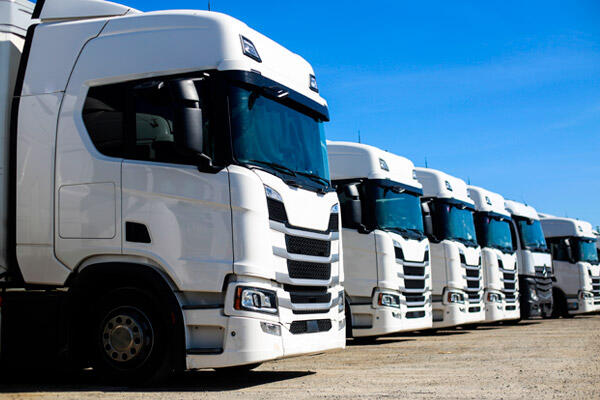What Are Energy Rebate Programs?
Earn rebates for your EV fleets

Earn rebates for your EV fleets
Energy rebate programs are government-administered programs aimed at reducing carbon emissions from transportation through market-based incentives. These programs offer EV fleet owners the opportunity to earn credits for their reduced emissions, which can be sold to carbon intensive fuel producers that are required to offset deficits.
How Does an Energy Rebate Program Work?
Assigning a Carbon Intensity
In regions with energy rebate programs, government entities assign transportation fuels a carbon intensity (CI) rating based on how much carbon they emit. Fuels with a lower carbon intensity rating than the program’s set standard, like electricity, earn credits, whereas fuels with ratings that exceed the standard generate deficits.


Balancing Deficits
Producers of carbon intensive fuels, known as regulated parties, must reduce their emissions to meet the standard or purchase energy credits to offset their deficits.
Generating Credits
Electric vehicle fleet owners generate credits for every piece of EV equipment they own. These credits can be sold to fuel producers with deficits.


Earning Rebates
EV fleet owners with credits earn cash rebates by selling their credits on a government-administered market, earning additional revenue while reducing their greenhouse gas emissions.
What Regions Have Programs?
Currently, energy rebate programs have been implemented in California, Oregon, Washington, and Canada.
The Low Carbon Fuel Standard (LCFS) was adopted in 2009 with the aim of reducing the carbon intensity of transportation fuels used in California by 20% by 2030. The program is administered by the California Air Resources Board (CARB).
Oregon’s Clean Fuels Program (CFP), implemented in 2016, seeks a 37% reduction in emissions from transportation by 2035. The program is administered by the Oregon Department of Environmental Quality (ODEQ).
Washington’s Clean Fuel Standard (CFS) went live in 2023, and aims to cut 4.3 million metric tons of carbon emissions from transportation fuels per year. The program is administered by the Washington State Department of Ecology (WDOE).
Canada’s Clean Fuel Regulations (CFR) are a federal incentives program aimed at reducing transportation emissions by 15% by 2030. The Province of British Columbia has adopted its own program referred to as the Low Carbon Fuel Standard (LCFS).
More
Currently, energy rebate programs only exist in the above-mentioned regions. However, energy rebate regulations are pending in many other states including Colorado, Ohio, Illinois, New Mexico, New York, Massachusetts, Minnesota, Pennsylvania, and Vermont.
In all regions with programs, Smart Rebates™ will do all the work of enrollment, reporting, trading, and management for you – at no out-of-pocket cost. Contact us to initiate the audit process.
FAQ
Who is eligible to earn rebates?
Every region has specific requirements regarding who can earn rebates, though most programs offer rebates to entities that purchase electric vehicles, including:
- Electric Vehicle (EV) fleet operators
- Electric forklift fleet operators
What equipment is eligible?
Vehicles powered by fuel with a lower carbon intensity rating than the program’s standard are eligible to earn rebates. Smart Rebates™ will help you earn rebates on:
- Electric / Hydrogen Forklift Trucks GSE
- Battery-powered Material Handling Equipment (MHE)
- Electric Transportation Refrigeration Units (eTRUs)
- Electric Trucks - All Classes and Yard Tractors
- Electric Buses and Shuttles
Will I earn a consistent rebate check for my electric fleets?
Rebate checks will arrive on a quarterly basis. Energy credit trading is a supply-and-demand market subject to many changes, so earnings may vary. However, over a 24 month period we typically outperform the 5-day average credit price by 17 to 20%.
Is it mandatory to opt in to energy rebate programs?
Mandatory-regulated parties include entities that import or manufacture fuels, while voluntary parties are entities that own electric vehicle fleets, EV charging stations, and owners and dispensers of natural gas. Voluntary parties are not required to participate, though their aggregated credits will go unused.
How do I estimate my earnings?
Smart Rebates™ will perform a full, no-cost audit to help you determine your potential savings through your region’s program. Unlike other rebate managers that require you to send them your company’s data, Smart Rebates™ ensures all information is accurate and up-to-date. Without in-person audits, you may be liable for inaccurate reporting, which may result in fines.
How do I enroll in the program?
Companies interested in enrolling in their state’s energy rebate program can find more information on their state-specific websites. Or, companies looking to enroll at no cost through Smart Rebates™ must first opt in by signing the Participation Agreement and allow SCT or our service providers to survey your site to assess and collect your forklift truck, MHE, transportation fleet, and battery charger data. Once your company is deemed eligible for Smart Rebates™, you’re only required to provide us with quarterly changes to your fleet. Read more about the fleet owner enrollment process.
How long do energy rebate programs last?
Currently, most energy rebate programs are in place for at least 12 years, though regulations and standards will likely change to encourage continuous carbon reductions. Learn more about each state’s program:
What’s the catch?
There is no catch! Energy rebate programs are an effective tool designed to incentivize businesses to reduce their carbon emissions and invest in cleaner technologies.
How Can We Help?
Smart Rebates™ takes the stress out of applying for and managing energy credits, allowing you to focus on your business while still taking advantage of your region’s rebate program. Our no-cost services take care of all compliance for you, including aggregating, reporting, and trading your credits.
With Smart Rebates™, you can generate additional revenue through your EV fleets, at no-cost and hassle-free.
Have other questions? Contact us, and an Energy Program Manager will reach out within 48 hours.
